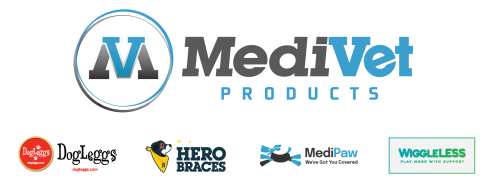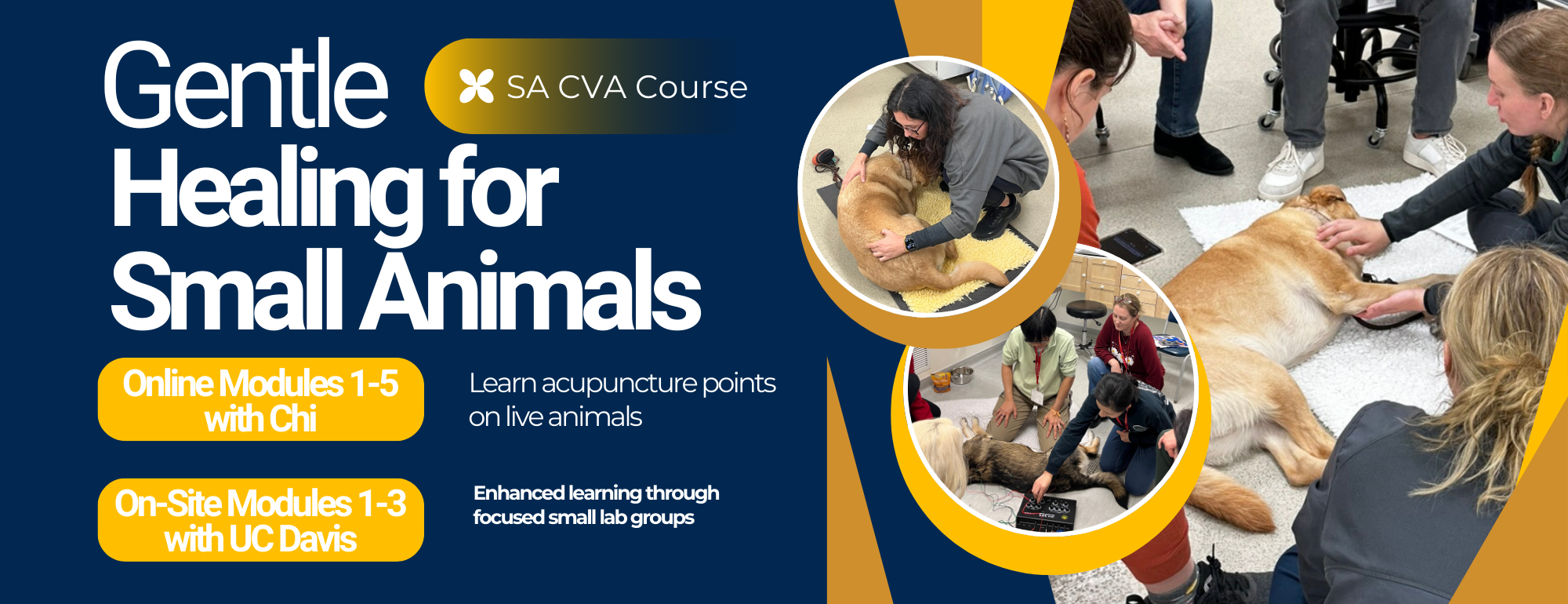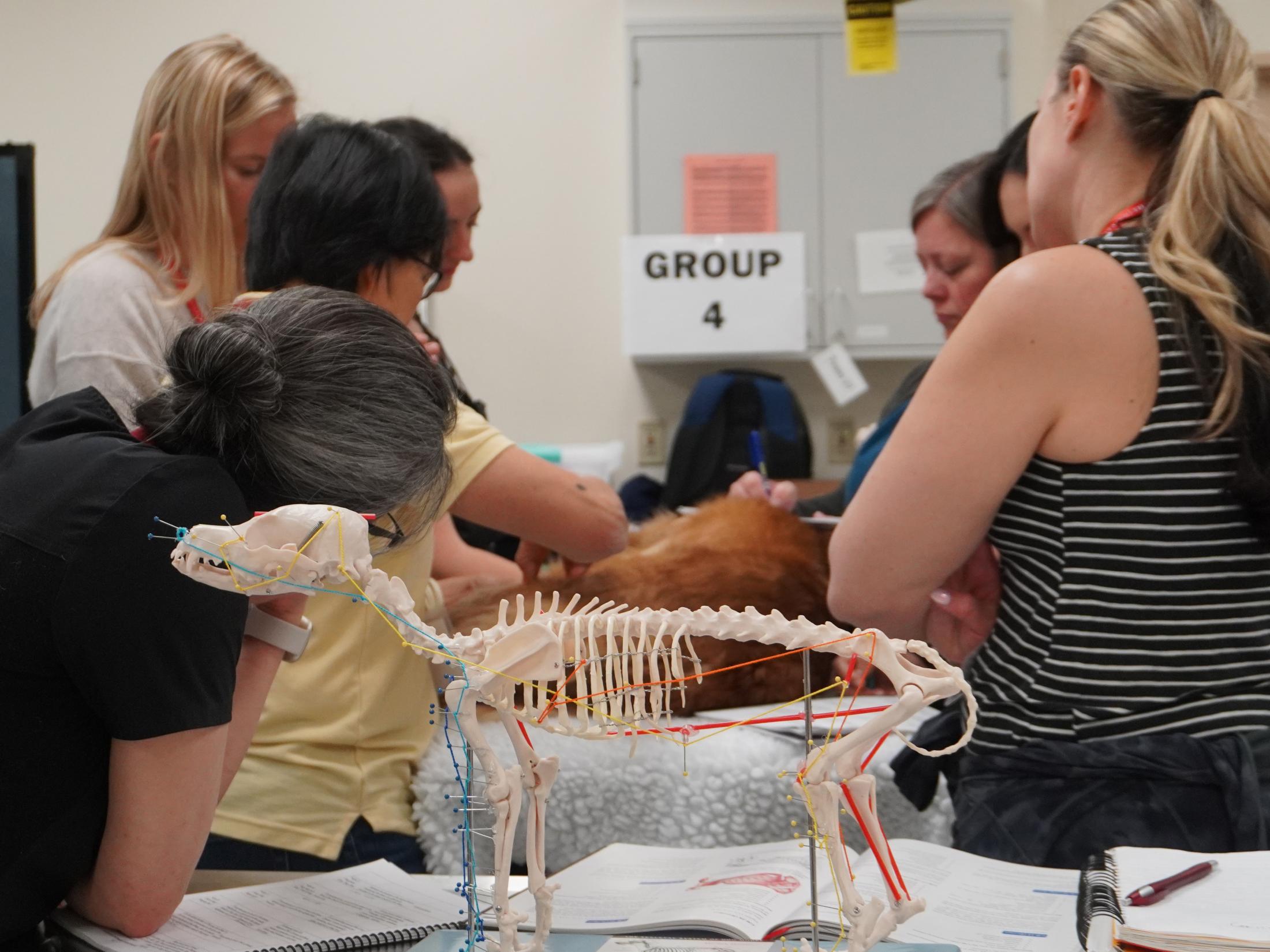
Hybrid Course
On-site dates for hands-on laboratories:
Module 1: April 11-12, 2026
Module 2: June 27-28, 2026
Module 3: September 26-27, 2026
On-Site Statutorily Approved CE Credit: Up to 45.5 hours
On-site Location: UC Davis School of Veterinary Medicine
Program Overview
This comprehensive certification course introduces core concepts of Traditional Chinese Veterinary Medicine, beginning with foundational theories such as Yin-Yang and the Five Elements—essential for clinical assessment and treatment planning. Students are trained in multiple acupuncture modalities, including electro-acupuncture, aqua-acupuncture, and moxibustion, going beyond basic dry needling.
Hands-on labs focus on acupoint location using live canine models, with enrollment capped at 24 participants to ensure a personalized, immersive experience. The certification is awarded by Chi University and hosted by the UC Davis School of Veterinary Medicine Center for Continuing Professional Education.
The program combines online and in-person learning. The online portion features five modules with 94 hours of lectures and case studies available on-demand. The in-person component includes three modules totaling 45.5 CE hours, held on-site at UC Davis, where students gain practical experience in small-group labs (no more than six students per instructor). An additional 12 hours of tutoring supports exam readiness and content mastery.


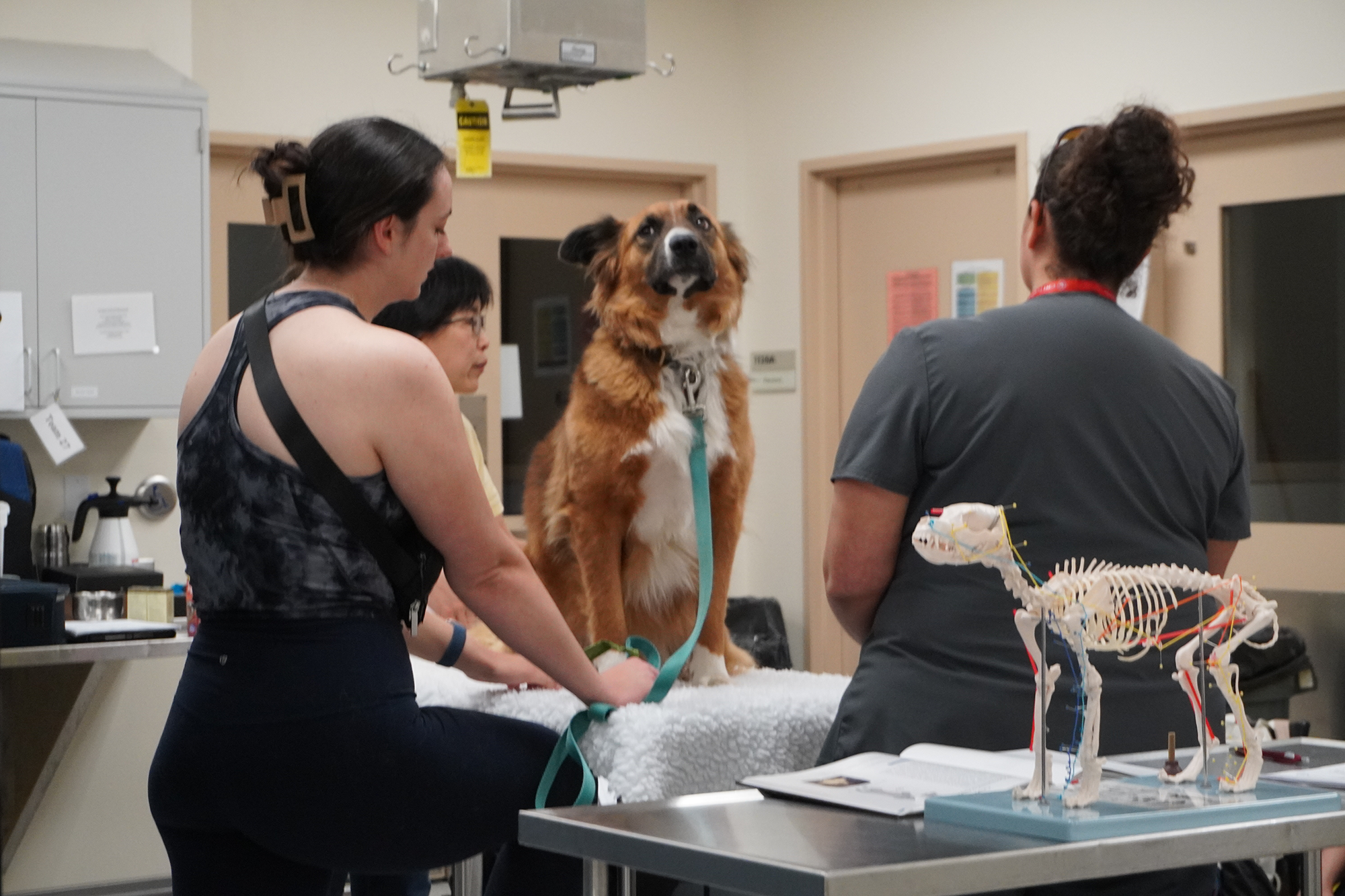
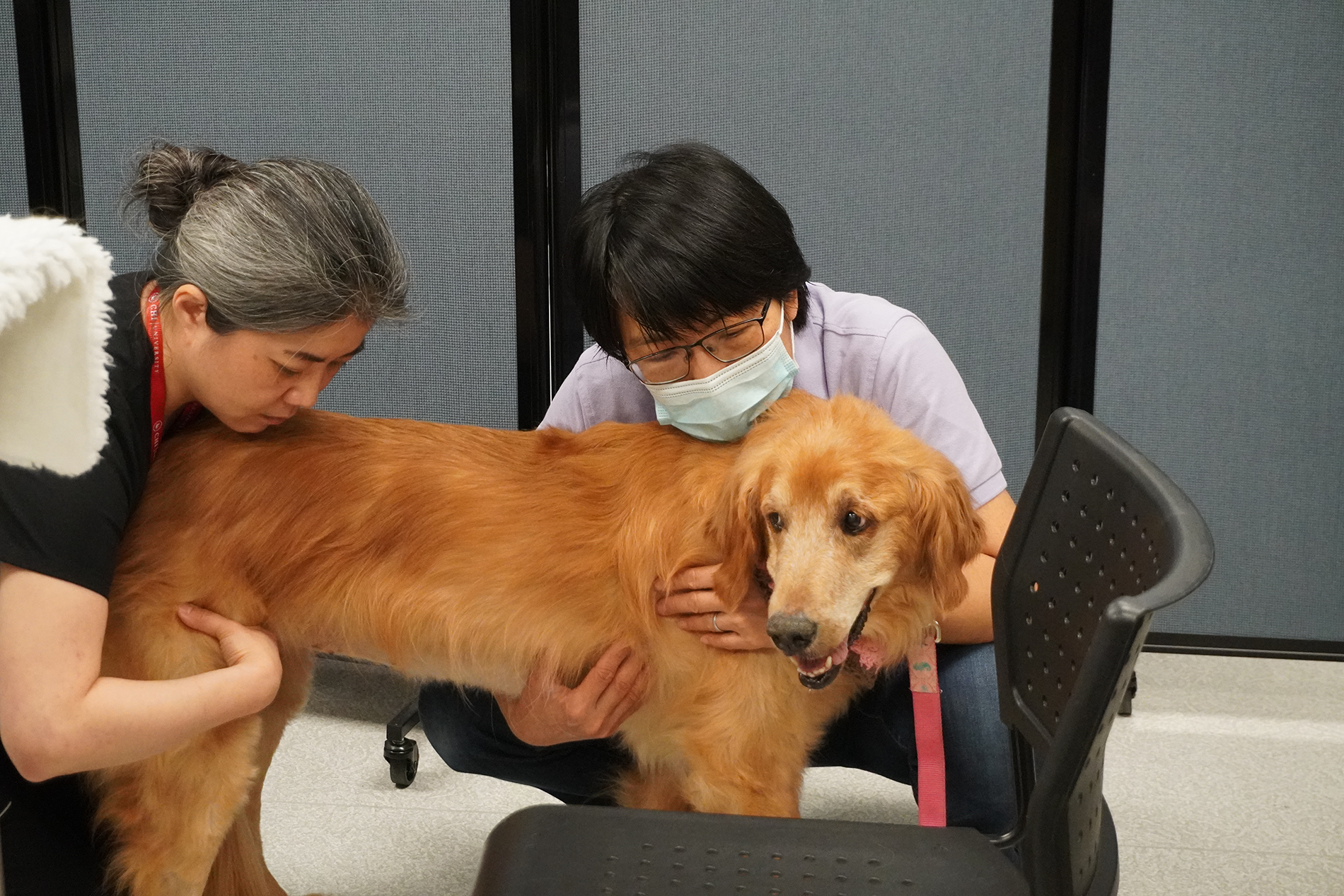
- Major Topics
- With a curriculum designed for students new to acupuncture, the Small Animal Acupuncture Program provides a comprehensive mix of both theory and practice. You will learn:
- Frameworks used in acupuncture: Five Elements, Yin-Yang, Eight Principles, Zang-Fu Physiology and Pathology, Meridians and Channels
- The scientific basis of acupuncture
- 167 canine acupuncture points on live animals
- Acupuncture techniques: electro-acupuncture, aqua-acupuncture, moxibustion, and dry needling
- TCVM diagnostic systems: patient personality, tongue and pulse diagnosis, and client inquiry
- How to integrate acupuncture into your practice
- Additional Benefits
- Enrollment in the Certified Veterinary Acupuncturist course includes:
- Complimentary canine acupoint chart
- Complimentary 32-hour Evidence-Based Veterinary Acupuncture Course
- 1-year complimentary membership with the World Association of TCVM (WATCVM)
- Free lifetime case consultation by Chi faculty
- Program Features
Enjoy the convenience of online learning with 20 hours of virtual lab learning in 143 total hours of hybrid courses
Over 35 hours of intensive hands-on learning with live animals in small lab groups capped at 6 students for every instructor lead by Dr. Sayaka Shiomitsu
Start practicing acupuncture on patients after the first on-site session
Earn up to 25% of future master's degree credit per experiential learning
Schedule
PROGRAM SCHEDULE ON-SITE MODULES 1-3 Now Available
- Online Modules 1-5
Introduction to the program and History Veterinary Acupuncture 1h
What is Acupuncture 1h
Veterinary Acupuncture: Scientific Basis 2h
Basic TCVM Theories - Yin Yang 1h
Eight Principles and Bian Zheng 1h
Five Elements 2h
Zang-Fu Physiology 2h
Channels and Meridians 2h
Top 10 Canine Acupoints and Clinical Applications 1h
General Rules of Acupuncture 4h
Indications for Veterinary Acupuncture 2h
How to Start your Acupuncture Practice 1h
Where Do I Start the Acupuncture Practice 1h
SA Anatomy for Acupuncturists 1h
Five Elements and Zang Fu physiology 2h
Five-Shu Transporting Points 2h
Other Special Points and Clinical Applications 2h
How to Treat Canine Diseases-Demo 2h
How to Treat Gastrointestinal Disorders 2h
How to Treat Respiratory Disorders 2h
How to Treat Bi/Wei Syndromes, Osteoarthritis and IVDD 2h
Canine Acupuncture Cases-Demo 2h
Five Treasure: Qi, Blood, Shen, Jing, Body Fluid Physiology and Pathology 4h
TCVM Diagnosis 4h
Eight Extraordinary Channels 2h
Etiology and Pathology 2h
How to Select Acupoints 2h
How to Make a TCVM Diagnosis (Dry Lab) 2h
Acupuncture for Neurological Disorders 2h
How to Approach Clinical Cases 2h
How to Improve Acupuncture Results 2h
Small Animal Cases: TCVM Approach 3h
Bubble Chart Review 1h
A Quick Review from Sessions 1 to 3 1h
How to Treat Renal Failure 1h
How to Treat Heart Failure 1h
How to Treat Behavioral Problems 1h
Herbal Introduction 2h
Acupuncture for the Liver 2h
How to Treat Skin Problems 2h
Acupuncture for Cancer 2h
Feline Acupuncture 2h
Case Studies from Students 1h
Avian Acupuncture 1h
Exotic Animal Acupuncture 1h
A Quick Review from Sessions 1 to 4 1h
Acupuncture for Endocrine Disorder 2h
Acupuncture for Immune-mediated Diseases 2h
Clinical Applications of TCVM 2h
Food Therapy Intro 1h
Introduction to Tui-na 1h
Liver Physiology and Pathology 1h
Lung Physiology and Pathology 1h
Spleen Physiology and Pathology 1h
Heart Physiology and Pathology 1h
Kidney Physiology and Pathology 1h
TCVM Overview 1h
How to Sell TCVM 1h
- On-site Modules 1
Veterinary Acupuncture Wet Lab and Practice 14h
Acupoint Review, Review Lectures, and Questions/Answers 3h
- On-site Module 2
Veterinary Acupuncture Wet Lab and Practice 13.5h
Acupoint Review, Review Lectures, and Questions/Answers 3h
- On-site Module 3
Veterinary Acupuncture Wet Lab and Practice 12h
Clinical Acupoint Exam 4h
Written Exam Online
- CVA Certification
- Students of the Veterinary Acupuncture program are eligible for the Certified Veterinary Acupuncturist certification endorsed by Chi University and the World Association of Traditional Chinese Veterinary Medicine (WATCVM). The CVA certification requirements are as follows:
Complete all sessions of the program
Pass three online quizzes with scores above 75%
Pass the final written exam proctored online after the final session with a score above 75%
Pass the clinical acupoint exam in the final on-site session with a score above 75%
Submit one veterinary acupuncture case report to be approved
Complete 30 hours of advanced TCVM program training or internship with a certified veterinary
acupuncturist
Please note that Chi cannot issue any certification to veterinary students until their DVM or equivalent has been obtained.
See the documents needed for certification here - Required Textbooks
- TCVM: Fundamental Principles
by Huisheng Xie and Vanessa Preast
Clinician's Guide to Canine Acupuncture
by Curtis Wells Dewey and Huisheng Xie
Course Instructors
- Sayaka Shiomitsu DVM, CVA, CCRP

Dr. Sayaka Shiomitsu grew up in Japan. She attended Azabu University in Japan and received a degree in Veterinary Medicine. She completed a Sports Medicine and Rehabilitation residency at the University of California, Davis CA and a Sports Medicine and Rehabilitation internship at Cornell University, Ithaca NY. She is currently a staff veterinarian at Small Animal Sports Medicine and Rehabilitation Service at the University of California, Davis. In addition to her work, Dr. Shiomitsu volunteered as a race veterinarian for the 2022 Yukon Quest sled dog race in the Alaskan interior and worked with exceptional, canine athletes. In her spare time, Dr. Shiomitsu enjoys biking and cooking.
- Emily Mangan DVM, CVA, CVCH, CVFT, CVTP, CVMMP, CCRV

Dr. Emily Mangan received her DVM from Oregon State University. Dr. Mangan studied veterinary
acupuncture at the Chi University as a veterinary student, and, following graduation, immersed herself in Chinese veterinary medicine (TCVM) by obtaining certification in Chinese herbal medicine, food
therapy, and Tui-na. She is also certified in veterinary medical manipulation and canine rehabilitation.
She completed an internship in Equine Medicine and Surgery at the Marion duPont Scott Equine
Medical Center at Virginia-Maryland College of Veterinary Medicine followed by an Integrative Medicine Internship at the University of Florida College of Veterinary Medicine, and wanted to treat every patient with TCVM along the way. She is an assistant professor at Chi University and frequently contributes journal articles and textbook chapters about TCVM. She lectures on TCVM in the U.S. and internationally, and serves on the board of the World Association of Traditional Chinese Veterinary Medicine (WATCVM). She lives on a little farm in Pleasant Hill, Oregon, and owns a house-call practice providing mixed-animal integrative medicine in the beautiful Willamette Valley.- Wei-Chen (Bernice) Kuo DVM, MS, CVA

Dr. Wei-Chen Kuo has been working for Anesthesia service in VMTH, University of California, Davis for the last 18 years after her DVM degree from National Chung-Hsing Univerisiuty, Taichung, Taiwan and anesthesia residency from Washington State Univerisuty. She enjoys the clinical teaching, including all veterinary anesthesia laboratories for different levels of students and clinical rotations. She is well liked by many students for her efficient and friendly teaching style.
With Dr. Kuo’s background, she is fascinated with Chinese Medicine. Since Traditional Chinese Veterinary Medicine is getting popular and accepted in western countries, she decided to take one step forward to get into a different world of medicine. Dr. Kuo was granted with faculty scholarship from Chi University, Reddick, FL in 2021 and completed her Certification of Veterinary Acupuncture in 2022.
With Dr. Ronald Koh’s mentoring, Dr. Kuo has been treating co-workers’ pets with different conditions. She also applies acupuncture to her clinical patients in multiple situations, like pain management, smooth recovery and resuscitation. She is able to broaden students’ view into TCVM at the same time. In order to utilize TCVM completely, Dr. Kuo plans to take more advance acupuncture and other TCVM courses in the future.
- Kristin Grimsrud DVM, PhD, CVA, CCRV

Dr. Kristin Grimsrud’s full-time work in academia focuses on translational medicine in both human and veterinary fields, with a particular emphasis on pain management. She graduated from UC Davis through the dual-degree program in 2011 (DVM) and 2012 (PhD), with a concentration in pharmacology and toxicology, followed by a residency in laboratory animal medicine. Throughout her career, she has maintained a strong interest in integrative medicine, earning certification in veterinary acupuncture through Chi in 2023 and Canine Rehabilitation certification in 2024. In addition to her academic responsibilities, Dr. Grimsrud continues to engage in diverse clinical work, with a particular focus on rescued animals and species-diverse integrative medicine.
Registration
Registration for the 2026 Small Animal Certified Veterinary Acupuncturist Course will open soon. Check back regularly for updates.
This course is offered by Chi University and hosted by UC Davis School of Veterinary Medicine Center for Continuing Professional Education. This class is limited to 24 students only.
The registration on the Chi website only covers the online session study. Students must also register for the on-site session with the UC Davis SVM Center for Continuing Professional Education.
Students will need to complete the online modules prior to attending the onsite modules. Once enrolled, students will receive a study guide to help them complete the online modules in a timely manner.
- How to Register
1. Register for Online Modules 1-5 with Chi University
2. After successfully registering for the online session with Chi University: Register for the On-Site Modules 1-3 with UC Davis
- Registration Fee - Online Modules 1-5 with Chi University
Online Modules 1-5
$3,915 - Registration Fee - On-site Modules 1-3 with UC Davis School of Veterinary Medicine
On-site Modules 1-3 in Davis, CA
Veterinarian $5,250 Veterinary Student $4,800 - Additional Hands-On Lab Materials
Required: Printed Wet Lab Notebook $100.00 Optional: Canine Skeleton Anatomical Model Kit
The kit includes supplies needed to build your own canine skeleton anatomical model for studying acupuncture points.What's inside the Kit:
- Canine Skeleton Model: Precision-crafted for detailed anatomical study.
- Push Pins: For secure assembly and customizable features.
- Multiple Colored Threads: To highlight and differentiate various anatomical structures.
- Straws: For structural support and articulation.
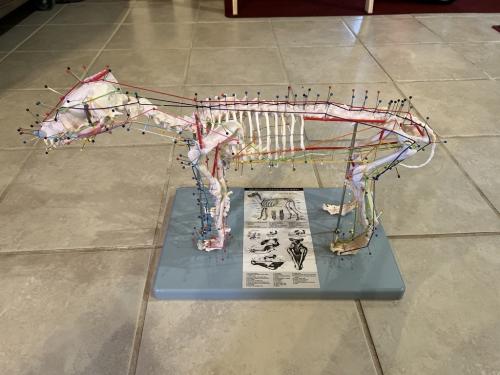
Why You Need This Kit:
- Comprehensive Study Tool: Perfect for veterinarians, veterinary students, and acupuncture practitioners.
- Hands-On Learning: Build and study your own model for a deeper understanding of canine anatomy and acupuncture points.
- Complete Kit: Everything you need is included, making it convenient and easy to use.
Ideal For:- Veterinary Education: Enhance classroom learning with an interactive model.
- Acupuncture Practitioners: Perfect for mapping and studying acupuncture points on a canine skeleton.
$425.00
Course Policies
- Course Enrollment Minimum Policy
A minimum of 12 participants is required to run this course.
After the initial 12 participants, enrollment will only continue in increments of 6 additional participants (e.g., 18, 24).
The course has a maximum capacity of 24 participants.
The Center for Continuing Professional Education (CCPE) reserves the right to cancel or postpone the course if the minimum enrollment is unmet.
If the course is canceled by CCPE, you will be notified via email and receive a full refund.- On-Site Modules Cancellation Policy
- Cancellations received at least two weeks before the program start date
Eligible for a refund, minus a 15% processing fee.
Cancellations received less than two weeks before the program start date
Eligible for a refund, minus a 50% processing fee.
After 5:00 PM (PT) the day before On-Site Module 1's start date
Registration is non-refundable, including for no-shows. Cancellations submitted on or after the program start date are not eligible for a refund.
All cancellation requests must be submitted in writing. Please email your request to svmcontinuinged@ucdavis.edu. - On-Site Practical Exam Reschedule Policy
- If a participant cannot attend the scheduled practical exam date for the course and would like a rescheduled date, a non-refundable $300.00 rescheduling fee will be required.
Email svmcontinuinged@ucdavis.edu to request a rescheduling. All date requests are subject to instructor availability. The CCPE team will work with you to confirm a new date and time.
In accordance with University policy and copyright law, the University prohibits distributing and/or posting on the internet any content from conferences without the explicit permission of the instructors and the UCD SVM CCPE.
THANK YOU TO OUR CORPORATE PARTNER
Silver Level

Bronze Level
